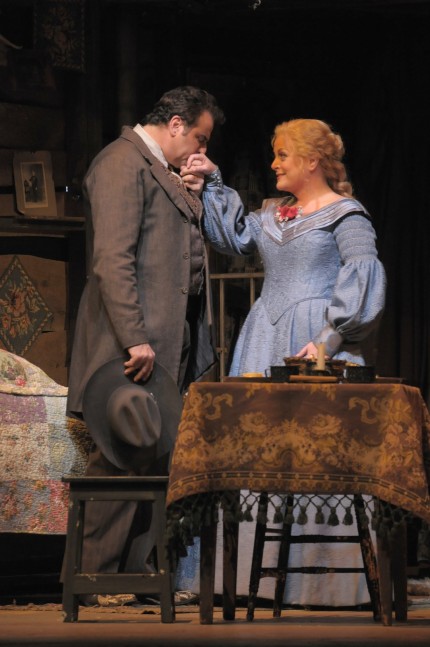Lyric Opera’s lively and engaging “Fanciulla” almost golden

It’s not hard to understand why Puccini’s La fanciulla del West has been such a snark magnet since its premiere a century ago.
Puccini’s acquaintance with the American West was largely imbibed from the David Belasco play that inspired it, which rarely rises above dime-store, them-thar-varmint cliches, even for its time. And while cast in the composer’s richly lyrical style, only the hero Ramerrez’s climactic Act 3 aria has caught on as an excerpted “hit” (not counting the source material for a theme cribbed by Andrew Lloyd Webber for Music of the Night). Also the quaint ugh ugh-ing of the Indians can give the more politically sensitive in the audience today a case of the vapors.
Still, for all its corny elements, dramatic weaknesses and musical unevenness, The Girl of the Golden West is a hard work not to like, the most warm-hearted of all the composer’s operas. While not among Puccini’s most indelible inspirations, the lyrical moments are cast in the composer’s richly soaring style. The role of the six-shooting, bible-reading saloon owner Minnie is a plum for any soprano. And it’s hard not to be moved by the final scene when Minnie rescues her man and implores the rough yet soft-hearted miners to forgive his thievery. Finally, who can’t fall for that rare Puccini opera with a happy ending and nobody dying at the curtain?
The Lyric Opera of Chicago opened its engaging production of The Girl of the Golden West Saturday night, marking the centennial season since the work’s starry Metropolitan Opera premiere in 1910 with Toscanini leading the celebrated cast of Enrico Caruso, Emmy Destinn and Pasquale Amato.
The Lyric Opera’s evocative Harold Prince production once again worked its practical magic on Saturday. The company fielded as strong a band of miners as one is ever likely to hear, Sir Andrew Davis and the orchestra provided first-class musical values and two out of the three principals delivered both the vocal and dramatic goods in outstanding style.
The wild card in the Lyric’s show is Deborah Voigt in the title role. Dramatically, the soprano seemed completely at home in the role whether in her hearty camaraderie with the boys in her saloon, breaking up bar fights with her six-shooter, or cheating at cards to save her man. Yet Voigt also showed touching vulnerability when conveying Minnie’s loneliness and her reawakened love for the on-the-lam bandit Ramerrez.
Vocally, however, Voigt’s performance was problematic. While her singing was somewhat more polished than her last Lyric outing as Tosca in 2009, her once-opulent instrument now sounds decidedly slender and distinctly underpowered for this role.
Voigt’s soprano has retained its clarity and tonal purity, but has lost much of its luster and heft. Every big vocal moment fell short Saturday with the singer scooping up to top notes, her middle and lower register often disappearing and insufficient power to sustain climactic high notes. Sadly, it’s increasingly hard to avoid the feeling that the singer’s plush, evenly produced soprano is now a shadow of what it once was, and that when she lost the weight she also lost much of the voice.
Marcello Giordani on the other hand remains in supreme vocal estate. The Sicilian tenor’s big, Italianate voice seems tailor-made for Minnie’s reprobate lover Ramerrez (masquerading as Dick Johnson). A gracious colleague, Giordani kept his voice down so as not to overwhelm Voigt in the duets, yet his clarion top C’s were as powerful as they were seemingly effortless, ringing through the vast house. Giordani’s impassioned yet tender Ch’ella mi creda was the highlight of the evening, and dramatically, Giordani did all that was required while underplaying the role of the guilt-stricken bandit effectively.
That style contrasted well with Marco Vratogna who made a sensational company and role debut as Jack Rance. Tall with a shaved head, the Italian baritone proved an aptly saturnine, malevolent foil for Giordani’s low-key hero, and romantic rival for the hand of Minnie. Vratogna sang with a dark and firmly focused voice, bringing a combustible snarling villainy to the role—almost a Scarpia of the Sierras. Yet he also conveyed the tough sheriff’s deep love for Minnie and was a constant enlivening stage presence, stalking around and angrily downing shots when his rival seems to be gaining Minnie’s affections.
As Nick, the wonderful David Cangelosi delivered yet another superbly etched portrait as Minnie’s sympathetic bartender. Craig Irvin was admirable as the Wells Fargo man Ashby, and one is unlikely to ever encounter a better sung band of prospectors than that assembled by the Lyric for these performances. Paul Corona got the evening off to a superb start with a yearning, lovingly nuanced account of Jake Wallace’s homesick ode. The rest of the miners (Paul La Rosa, Rene Barbera, James Kryshak, Paul Scholten, Philip Kraus, Daniel Sutin, David Portillo and Corey Crider) contributed individually as well as blending superbly with the men of the Lyric Opera Chorus in the ensembles. As the Indians, Billy and Wowkle, Evan Boyer and Katherine Lerner were refreshingly dignified and avoided the usual demeaning caricatures.
Harold Prince’s revolving set presents picturesque interior and exterior snapshots of Minnie’s “Polka” saloon and mountainside cabin. Vincent Liotta showed himself a masterful stage director moving the hectic action naturally and efficiently. He may want to rethink Minnie’s climactic entrance via a railroad handcar, which elicited laughter opening night.
Sir Andrew Davis directed a lush account of the score, drawing sumptuous and polished playing from the orchestra, a couple of trumpet muffs apart, that brought out the lyric richness as well as the the tenderness.
La fanciulla del West runs through Feb. 21. lyricopera.org; 312-332-2244.
Posted in Performances

